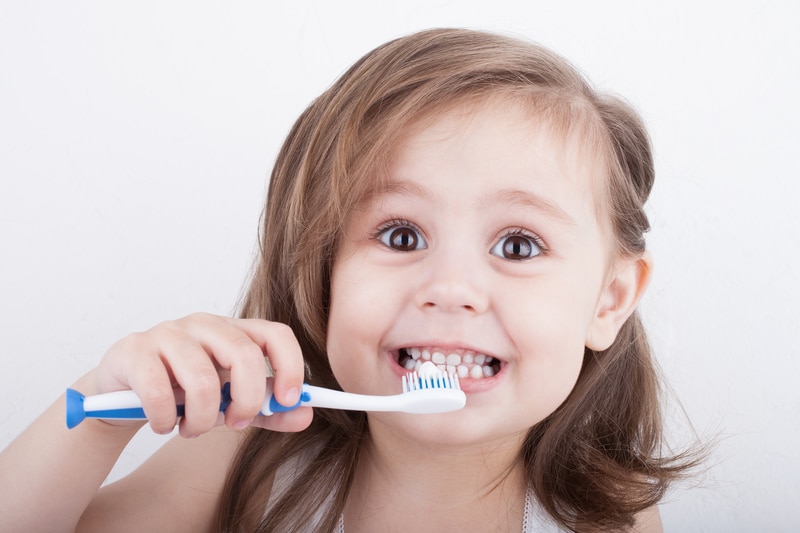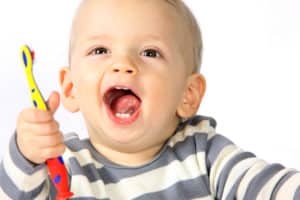Tips for Taking Care of Baby Teeth


Did you know that you get two sets of teeth throughout your lifetime? The first set comprises the 20 delicate baby teeth that will eventually fall out to make way for the 32 adult teeth. Right from the time a baby gets their first tooth, that tooth needs to be cared for or tooth decay can quickly set in. Whether it’s for a new infant, a toddler, teen or yourself, find out how to properly care for the baby teeth and your own teeth!
The Baby Teeth
An infant will only have 20 baby teeth in their mouth, but an adult will have 32 larger, adult teeth. An infant grows slowly throughout childhood, and their mouth grows with them. The baby teeth can start to come in immediately, or they can take up to the second or third year to start coming in. However, most infants will start to get their baby teeth between 3 and 12 months. The teeth are actually the strongest substance in the body, but because baby teeth are so small, they can still be quite delicate.
Despite their size, the baby teeth will determine much about a person’s adult teeth. Over time, the mouth will grow and around age 7 or 8, the baby teeth will start to fall out. An interesting aspect of this growing and shedding of teeth is that the baby teeth come into the mouth in the same order that they start to fall out. The teeth many even space out before they start to fall out, which is the mouth growing to make room for the adult teeth to drop in. If the baby teeth are not cared for properly, then those delicate baby teeth can decay and fall out too soon, messing up how the adult teeth come into the mouth.

Taking Care of the Baby Teeth
So what can you do? You can take care of the baby teeth as soon as you see the first one come into your child’s mouth. When that first baby tooth pops through the gums, make sure you have a finger gum brush to gently brush that baby tooth. This is especially important after nursing or after an infant takes a bottle, as those milk sugars can decay the baby teeth. Some tips to follow for healthy baby teeth include:
- Never leave a baby bottle with an infant overnight or when they sleep. This may mean the child is sucking all throughout the night, exposing their teeth to decay-causing sugars constantly. This decay happens so easily, that it’s known as “baby-bottle tooth decay”.
- Use an infant brush that fits the size of the mouth. With it, use a tiny amount (rice-sized) of fluoride toothpaste to brush with.
- Wipe an infant’s teeth and gums with a wet cloth after eating to reduce plaque buildup.
- Make sure the teeth are brushed before bedtime, after nursing or bottle-feeding.
- Take infants to dental visits biannually after 1 year.
Dental Visits: When Should They Happen?
The American Academy of Pediatric Dentistry recommends that parents bring their infants in for their first dental visit as early as 1 year of age. The goal is to see an infant within 6 months of them getting their first tooth. That first tooth is usually the start of an infant getting the rest of their baby teeth, which should all be in by age 3. Once that first dental visit is established, it’s important that infants and children continue to go to dental cleanings and exams every 6 months, just like teens and adults.
These dental visits are so important for children to keep their baby teeth healthy, which prevents oral health problems with decay and tooth loss that can affect the adult teeth. If a baby tooth falls out too soon, it can mean that an adult tooth comes in too early and in the wrong place. This can cause other teeth to come in incorrectly and for major oral health issues to arise. When children are seeing a dentist often, the dentist can make sure children keep their baby teeth healthy so their adult smiles can be healthy too.

What Can You Expect?
The first dental visit can be different for every child depending on their age and their needs. Make sure that you take a child to a dentist trained to do pediatric, family or general dentistry. You want someone that has worked with children before. That first dental visit won’t involve a dental cleaning if they are very young infants.
We review all medical history at this first appointment. If a child is visiting for the first time, they start of their new dental record. For infants, we do a very quick examination of their gums and teeth to see how they are developing and how they are coming into the mouth. This is a great time for parents to learn how to properly take care of their infant’s baby teeth and what oral hygiene products they should be using.
Parents can hold infants at this first dental exam and for some of those exams following as we look in their mouths for dental issues. For children with all their baby teeth or most of them, we can assess bite and alignment to see if dental issues will develop, worsen, or will cause speech issues. The dental visit is quick and easy the first few times, yet children benefit by catching tooth decay or bite problems early on. Those problems can be fixed quickly to avoid dental problems in the future. If you want to know more about a child’s first dental visit or how to care for your child’s baby teeth, call Dr. Ania’s office today at 303-443-0998!


